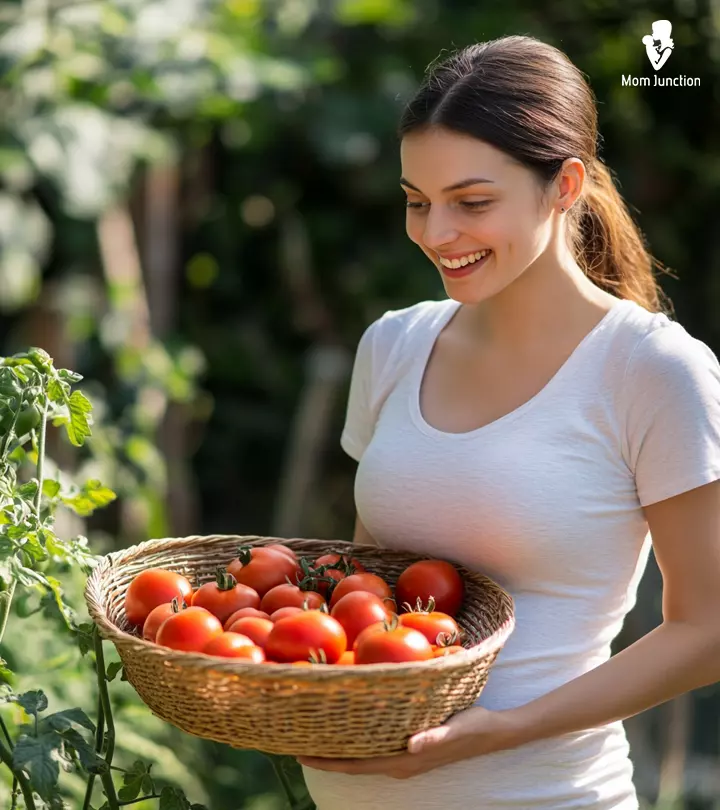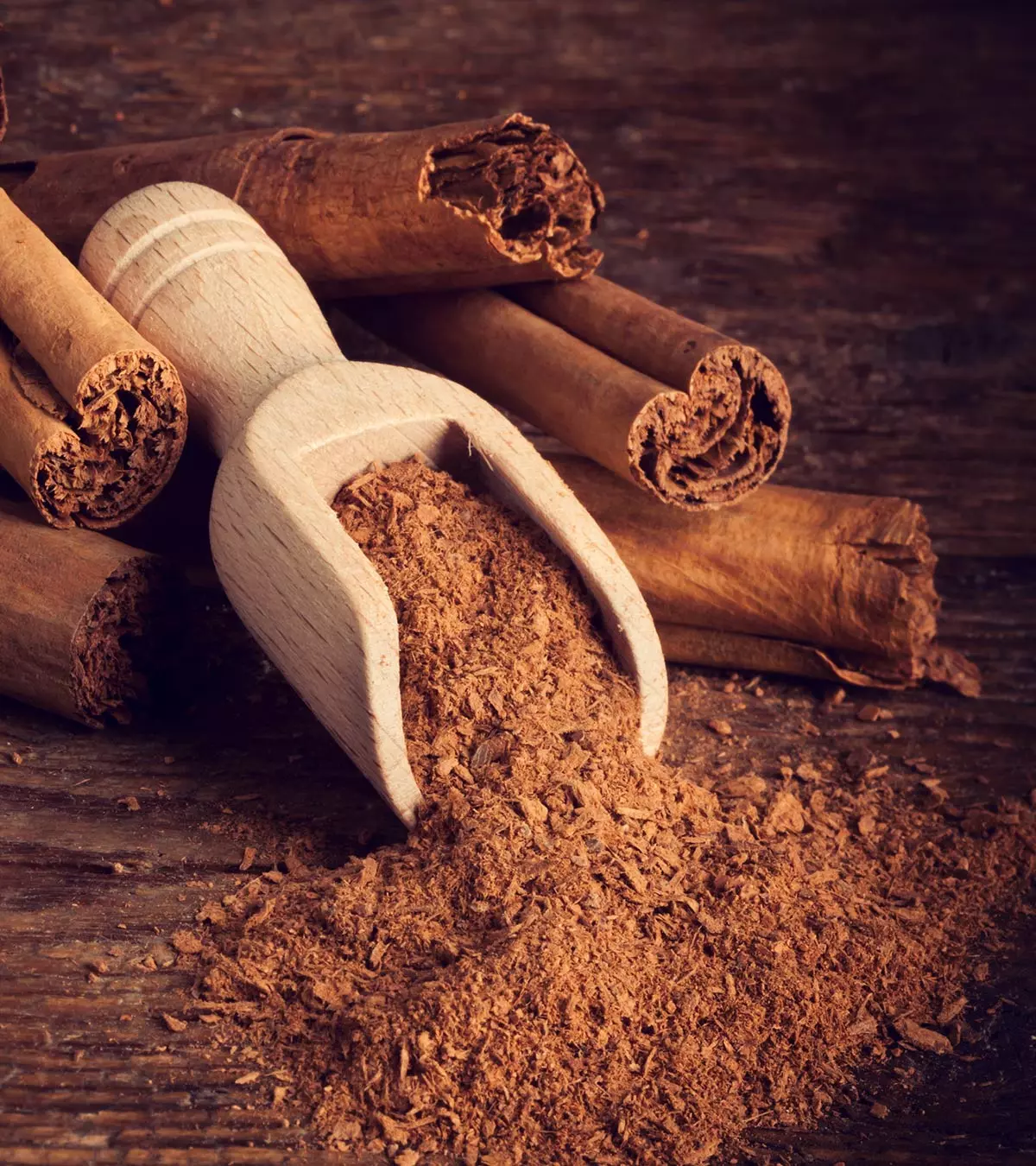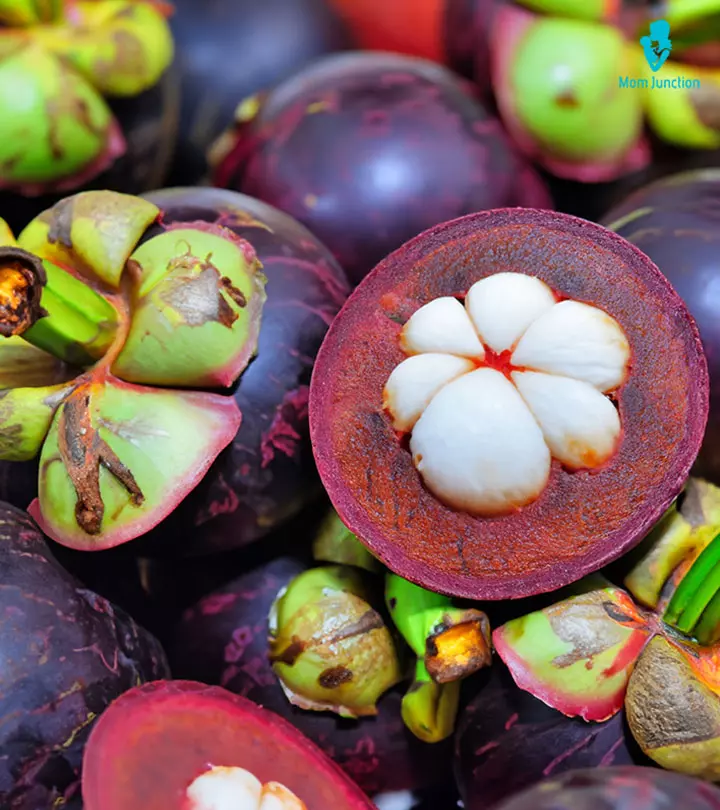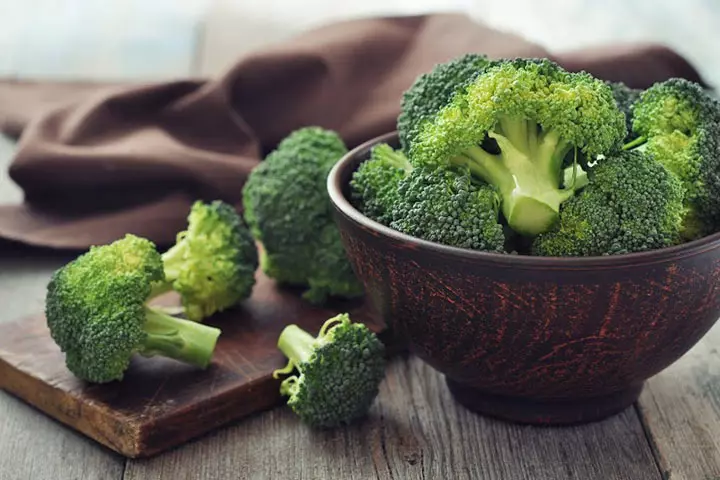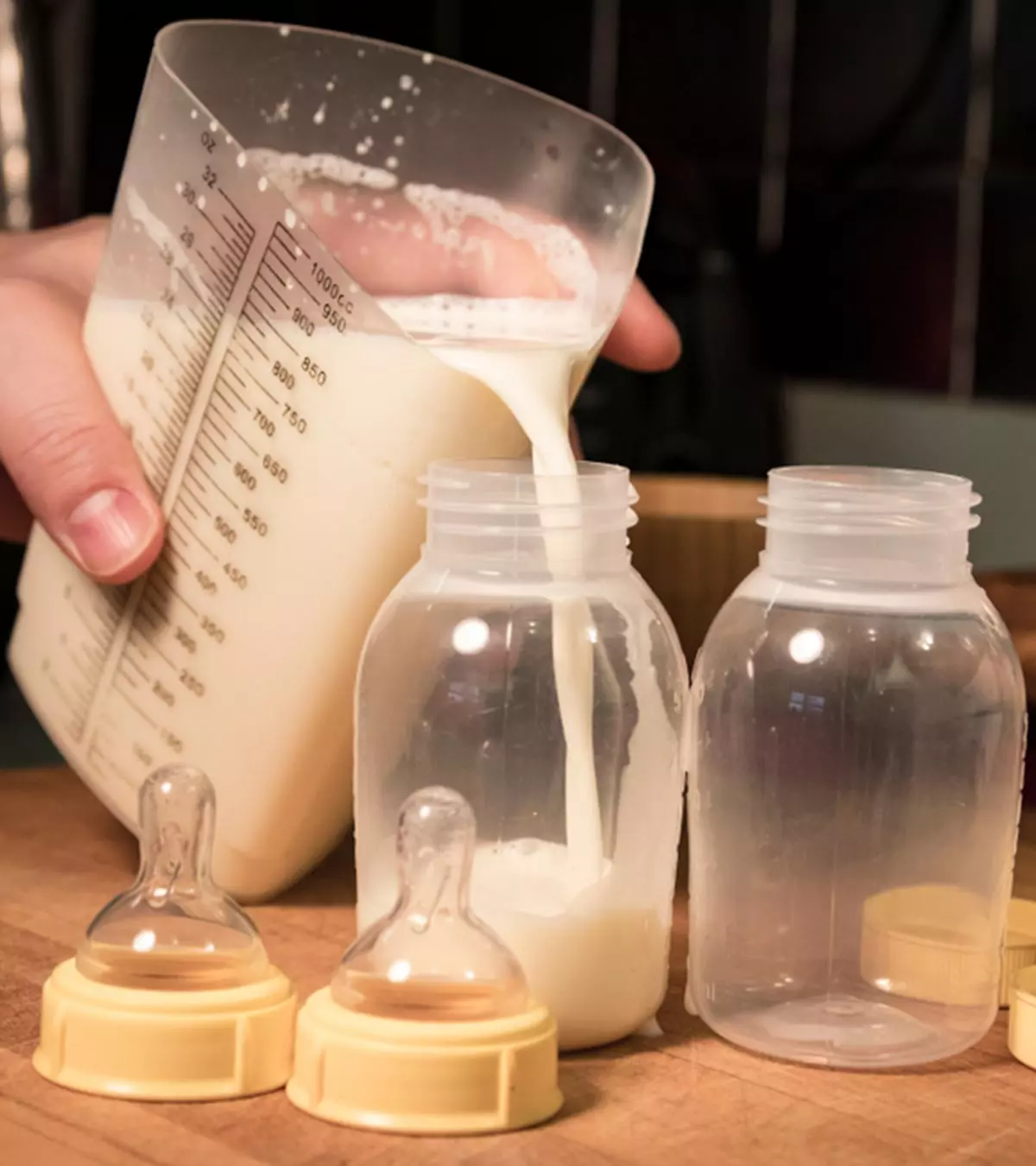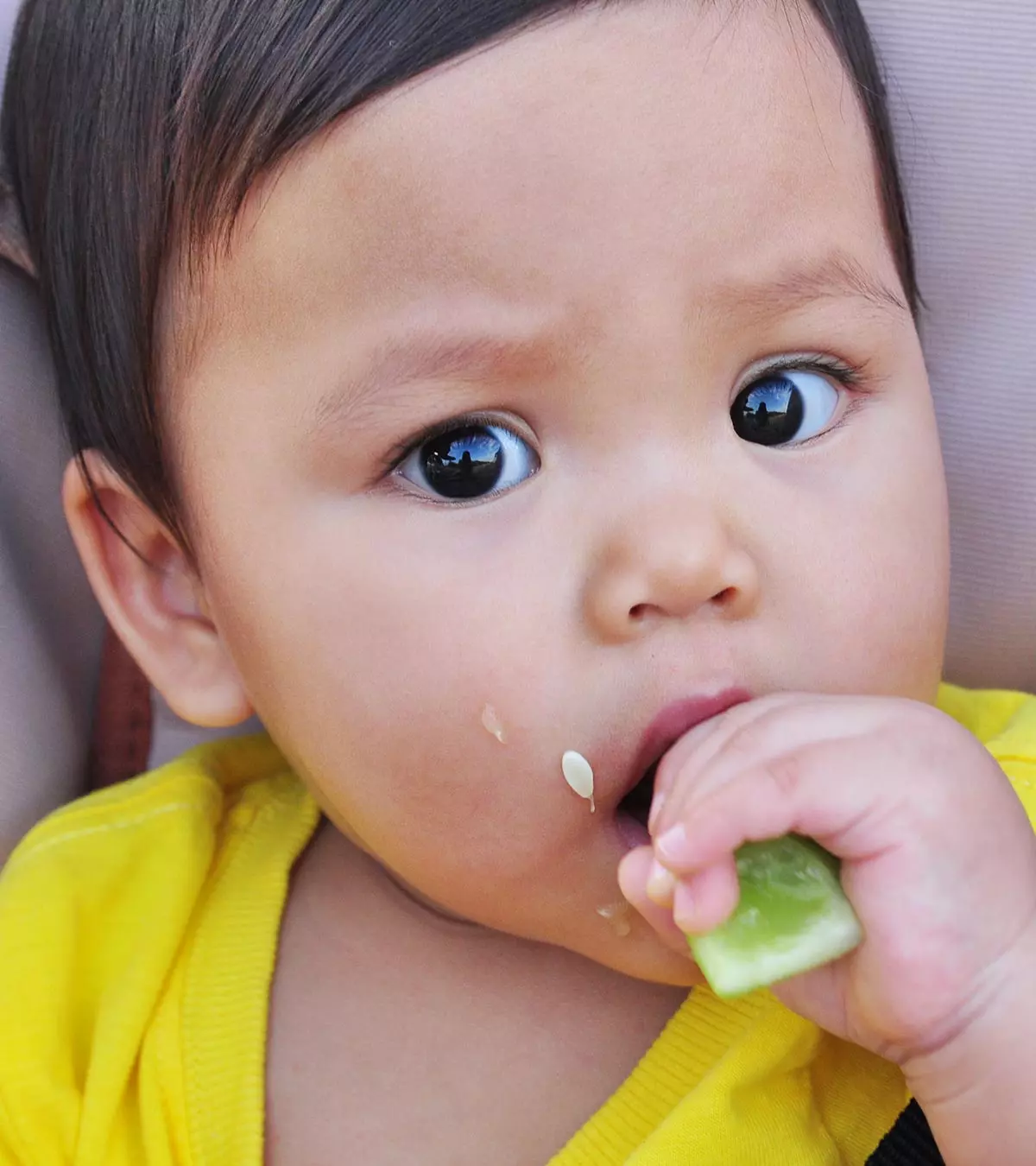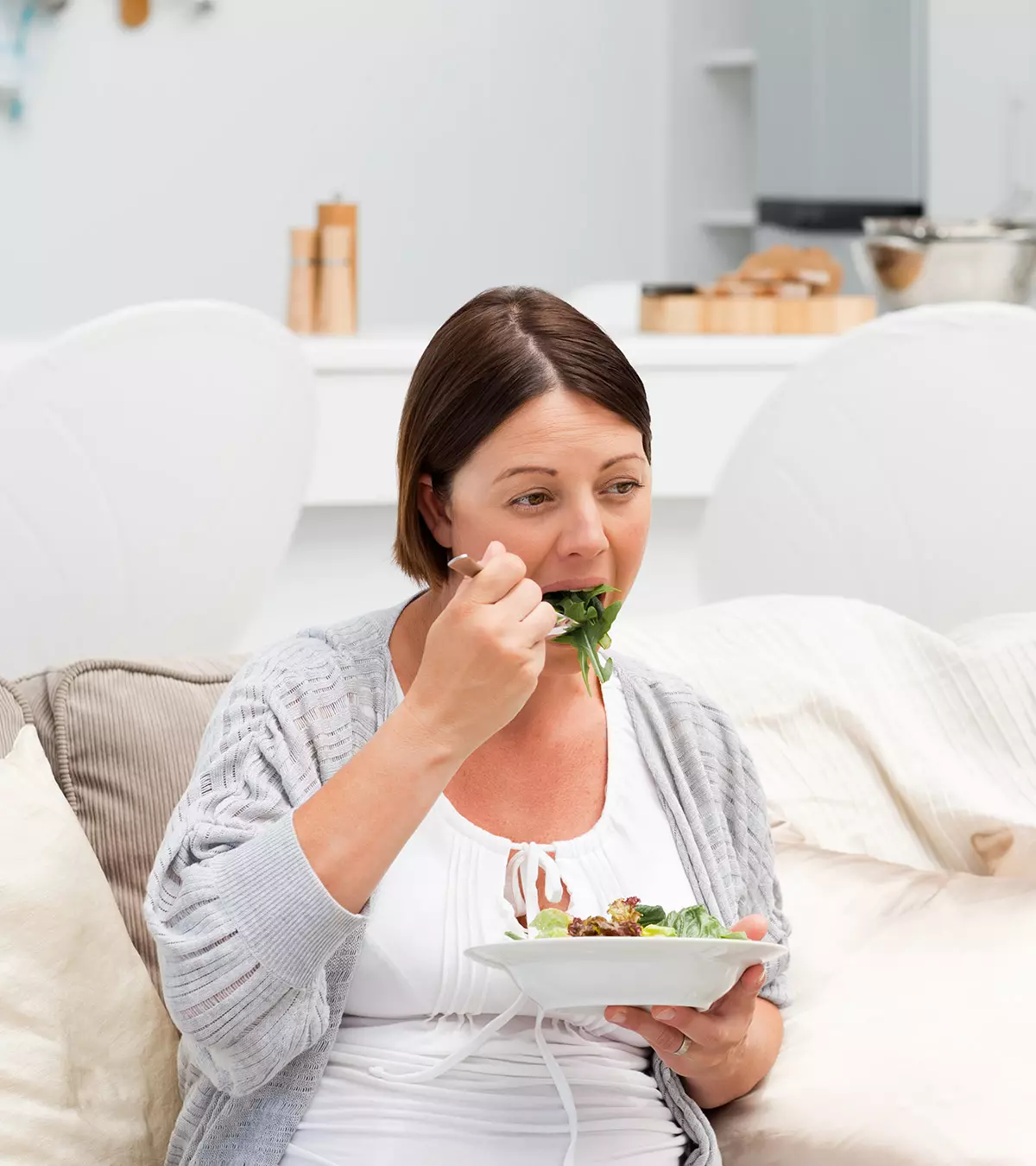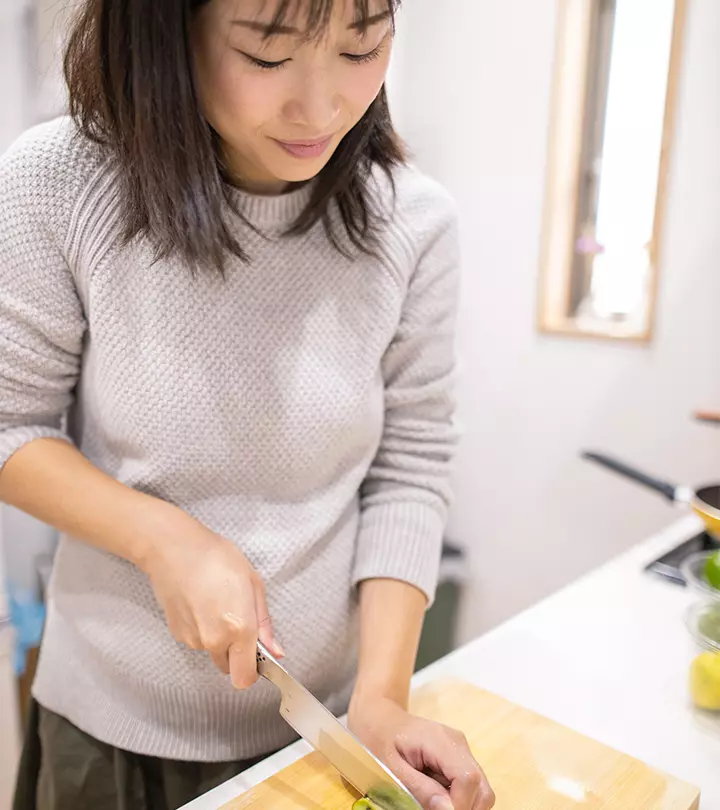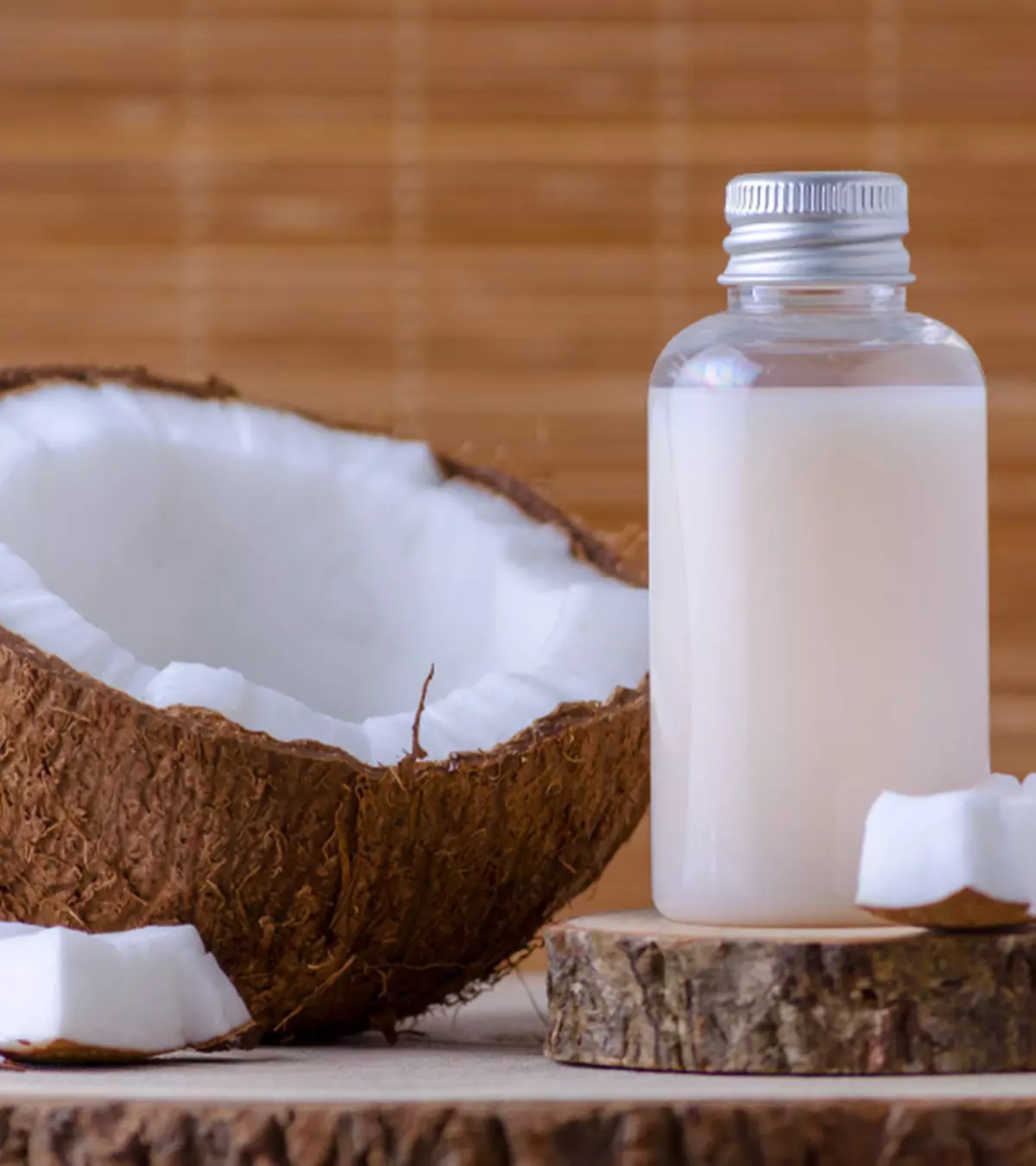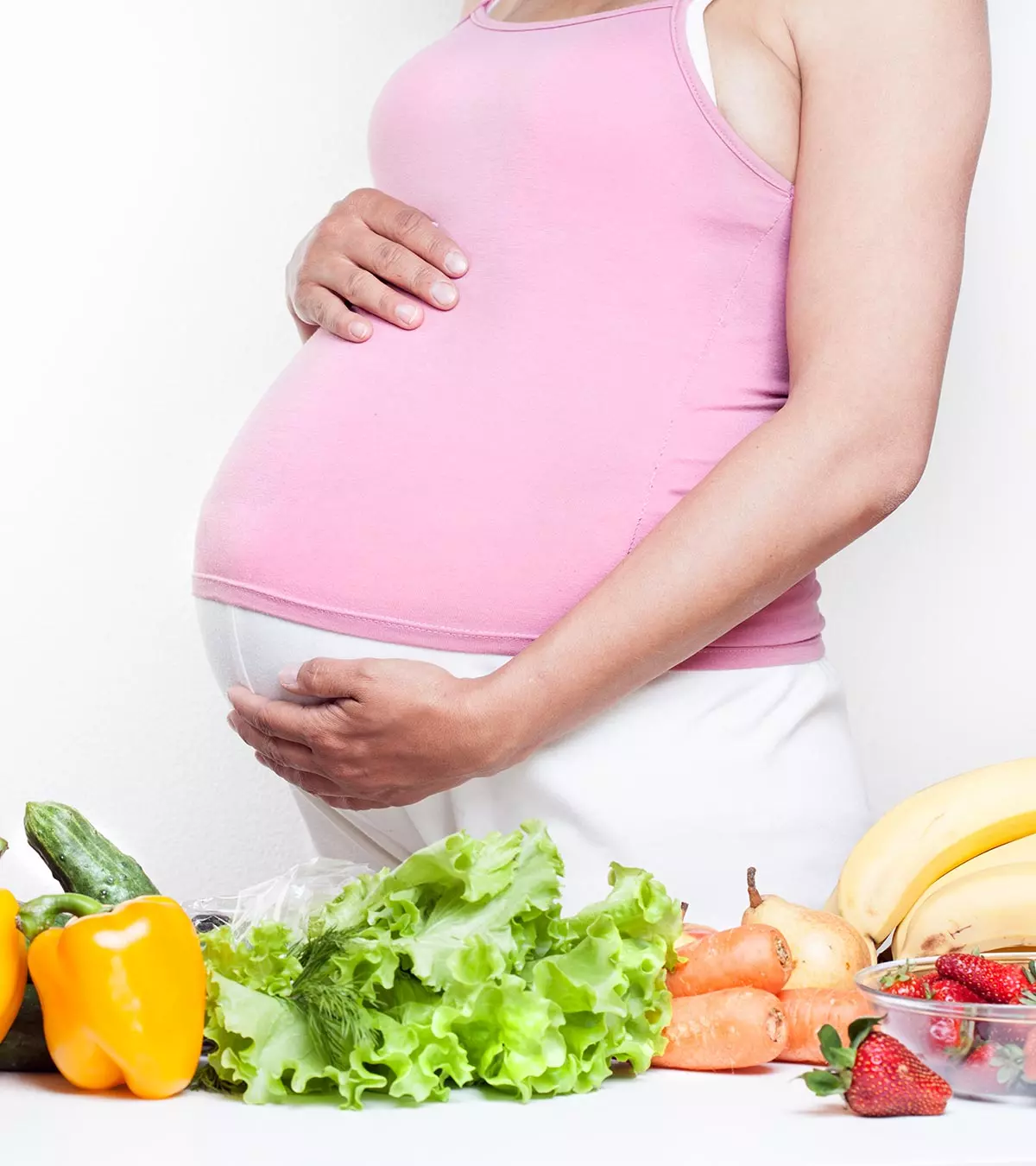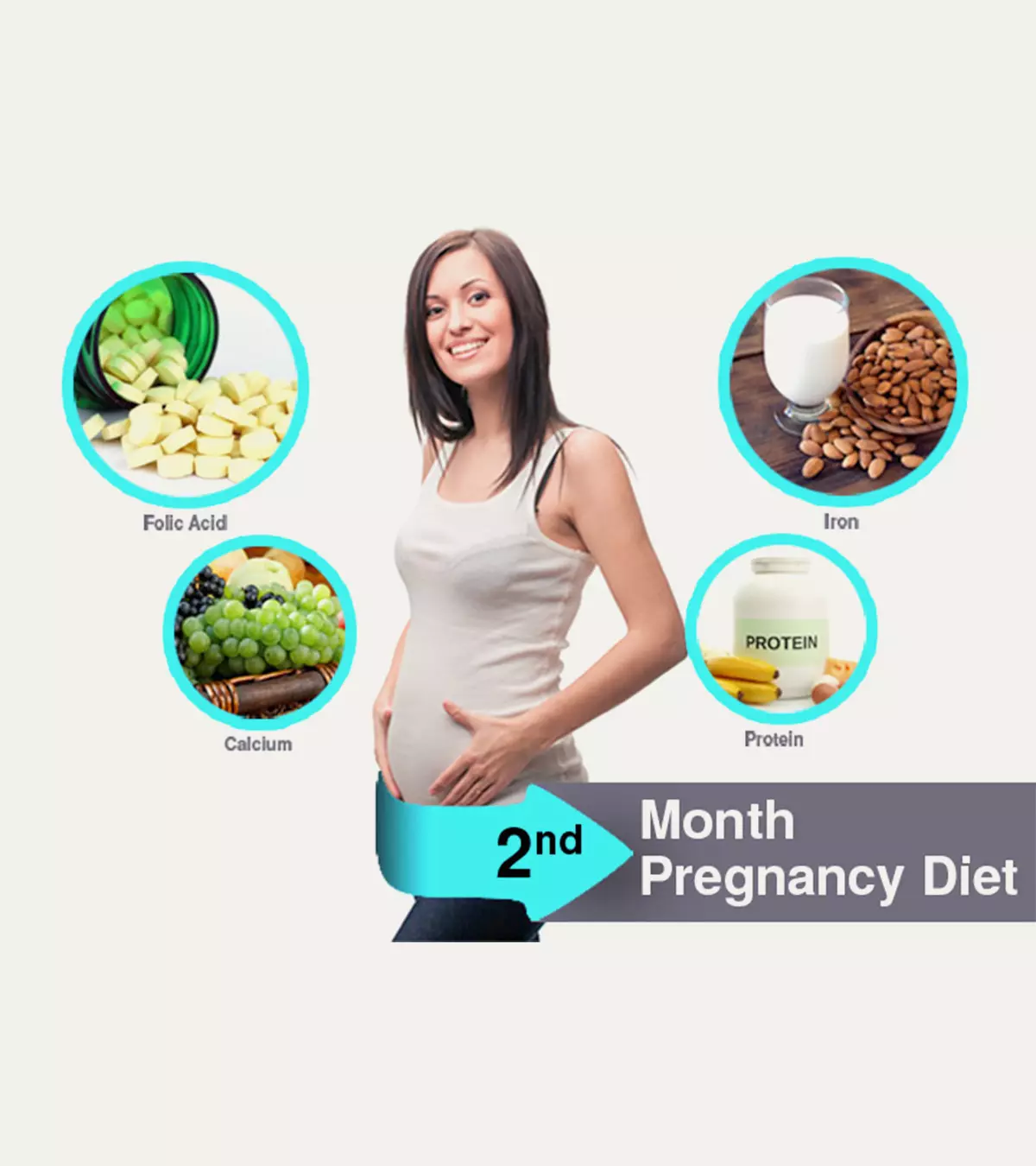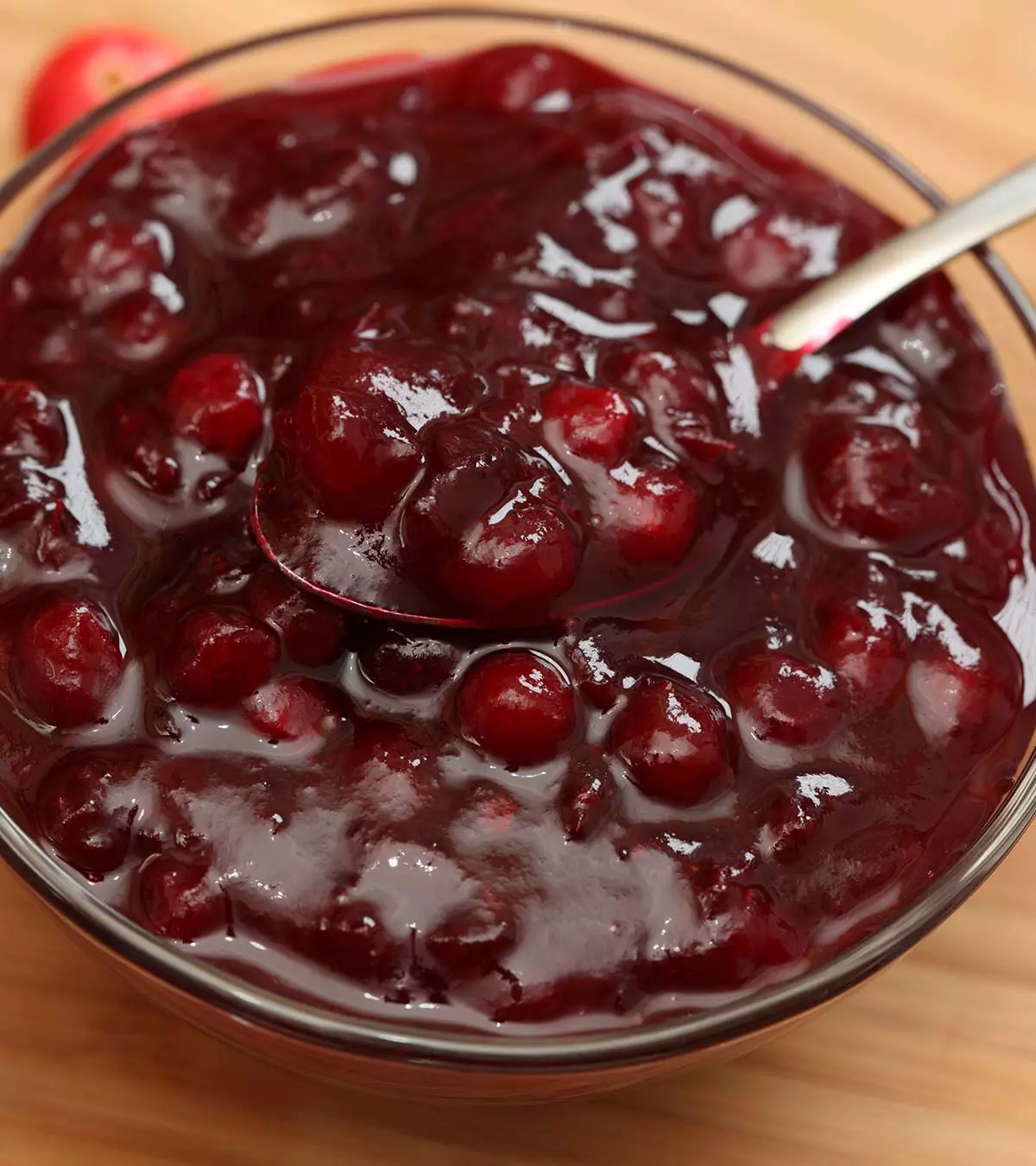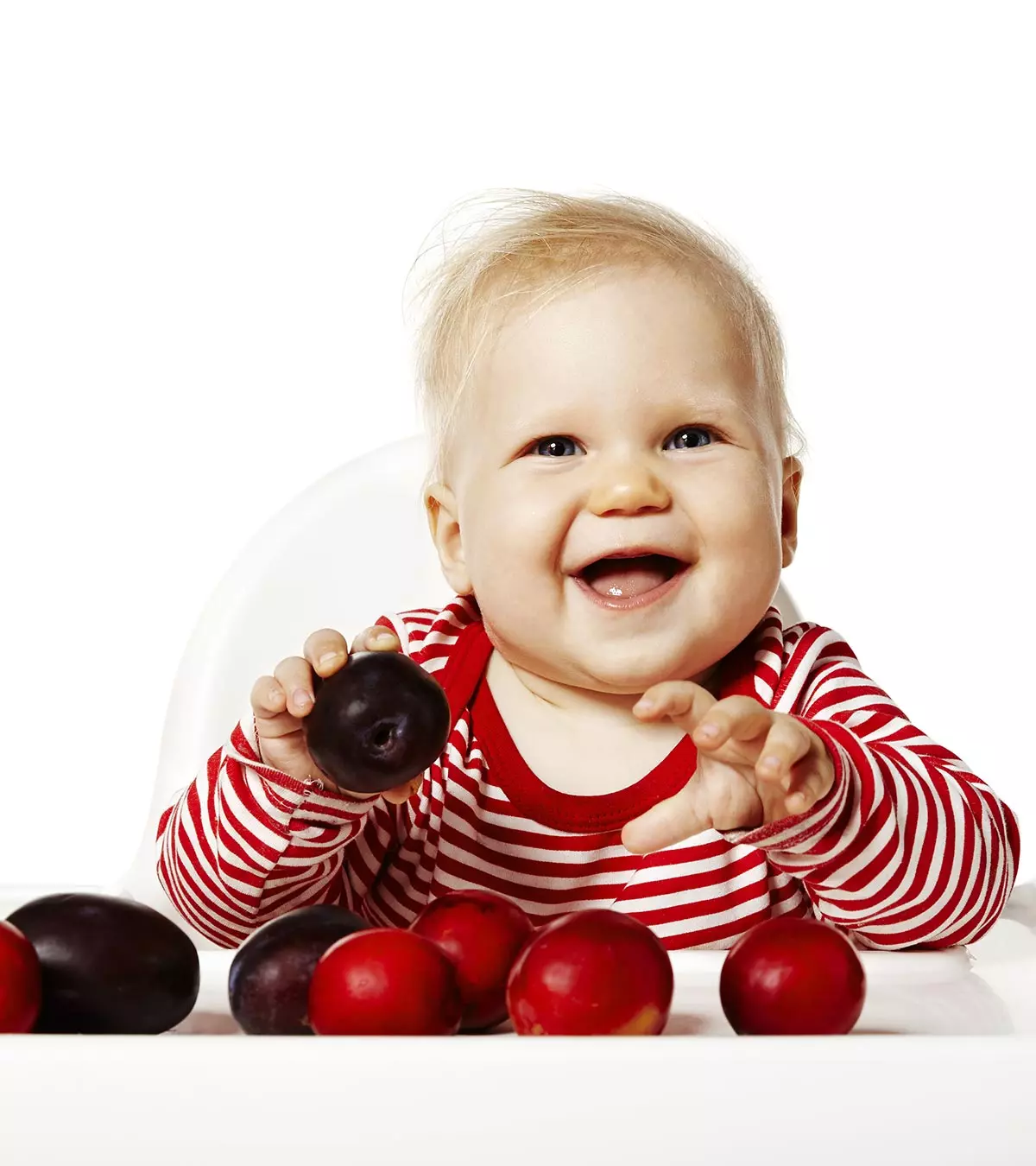
Image: ShutterStock
Plums are superfoods with health-promoting properties and high nutritional value (1). As a new parent, you may want to learn a few plum recipes for babies since common recipes may not be suitable and palatable. Babies older than six months who are already taking solids can begin to eat plums as per pediatricians’ recommendations. This sweet and sour fruit can be a good choice for baby-led weaning. You may begin with simple plum recipes such as puree and in lesser quantities, as it can be hard for your baby’s immature digestive system. Read on to learn about its benefits, how to incorporate it into a baby’s diet, and some healthy plum recipes for babies.

Key Pointers
- Plums are high-nutrient superfoods suitable for babies over 6 months old.
- They are rich in vitamins, minerals, fiber, bioactive, and phytochemical compounds, offering various health benefits.
- Plums act as a natural laxative, preventing constipation, and have anti-inflammatory, anti-allergy, and antimicrobial properties.
- Plums may improve bone health and enhance brain function.
- Plum-based baby food options include puree, yogurt, porridge, baked and roasted plums with various combinations.
Health Benefits Of Plums For Babies
Registered dietitian Alicia Chacha Miller says, “Babies can start enjoying plums once they reach six months of age and show all signs of readiness for starting solids. Plums are rich in micronutrients like vitamin A, which supports healthy skin and eyes; vitamin C, which boosts immune function; and vitamin K, which helps with bone development and healthy blood clotting.” Plums are a low-calorie fruit that contains many vital vitamins, such as A, C, K, B and minerals such as potassium, copper, manganese, phosphorus, magnesium, and fiber, bioactive compoundsiChemicals found in fruits and vegetables that are beneficial for their antimicrobial and antioxidant properties , such as anthocyaninsiDeep red, blue, and purple pigments found in plants (2) (3).
- Dried plums or prunes are associated with bone health due to its unique nutritional profile that contains major phenolic compounds (4).
- Both fresh and dried plums have laxative effects as the fiber in it is mostly insoluble and contains sorbitoliA sugar alcohol with laxative and diuretic properties which has natural laxative effects. Thus, they are associated with healthy intestinal motility and help keep constipation at bay (5) (6).
- Plums contain phytochemicalsiBioactive compounds found in plant-based foods that act as antioxidants and have antimicrobial effects such as cyanidiniWater-soluble organic compounds that impart red, orange, and blue colors to fruits and flowers and luteiniA carotenoid protecting the retina from damage due to overexposure to light . Some studies show that regular consumption of plums could possibly have beneficial effects on brain functioning (7).
- Plums are considered a good source of phytonutrients such as flavonoidsiNaturally occurring chemicals found in fruits and vegetables that are beneficial to health , neochlorogenic, and chlorogenic acid, which have high antioxidantiMolecules in the body that prevent cell damage caused by free radicals activities. These compounds could help reduce inflammation and combat free radical damage in the long run (7).
- Being rich in fiber, plums may help lower the risk of colorectal cancer, heart disease, and type II diabetes. They may also support healthy weight management (8).
A study conducted by researchers at Texas A&M University and the University of North Carolina found that dried plums can support the growth of beneficial gut bacteria throughout the colon, and by doing so, may reduce the risk of colon cancer (9).”
Besides these, plums are considered to have anti-inflammatory, anti-allergy, and antimicrobial properties, which are beneficial for your infant (10).
 Research finds
Research findsIf you are planning to add plums in your baby’s diet, then in the next section, we present the various plum recipes that you can consider for your baby.
Delicious Plum Recipes For Babies
1. Plum Puree
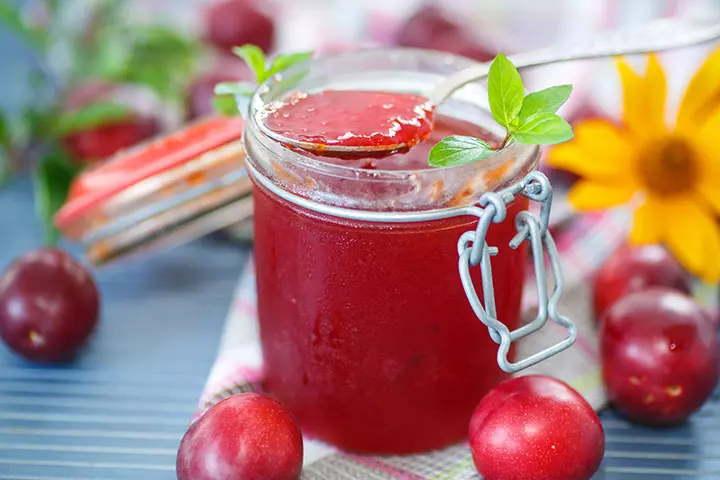
This is the most basic baby food recipe that is ideal for babies who have started solids. You can either prepare fresh plum or prune puree for babies. As the baby progresses on solids, you can try adding different purees or mashed fruits to this recipe to intensify its nutritive value.
You will need:
- 1 cup fresh plums
- Water – Room temperature and ice-cold
How to:
- Wash the plums and let them dry. Add water in a pan and let it boil. Add the plums and let them stay in the boiling water for about 45 minutes. This process of treating plums is known as blanching. You may also try to steam them instead of blanching.
- Meanwhile, put ice water in another pan and keep aside.
- Using a spoon, remove the plums from the hot water, and immediately transfer them into the ice-cold water.
- Remove the plum from the ice-cold water and use your fingers or a knife to peel off the skin.
- Slice the plums from the middle and remove the seeds. Puree the plum in a blender or mash it until soft. You can add water or a bit of breast milk or formula milk to make it creamy.
2. Plum yogurt
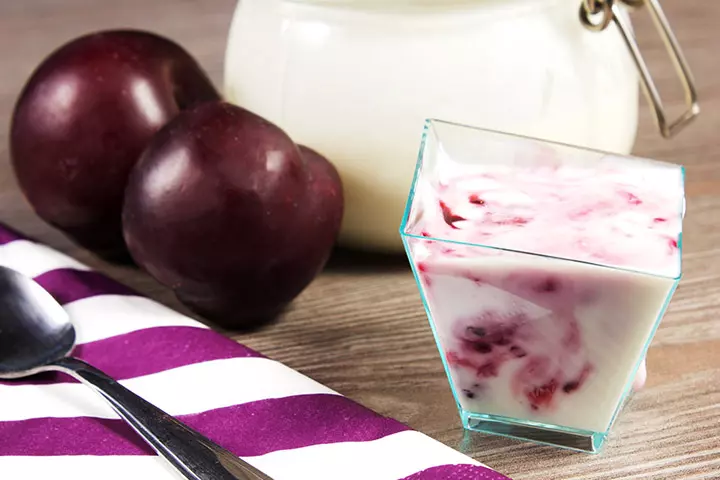
This quick recipe is a step forward from basic plum puree. The addition of Greek yogurt improves the nutritional value of this plum baby food recipe. Besides, yogurt enhances the gut microbiota, which helps your baby’s digestive system remain robust.
You will need:
- 1 cup fresh plums
- 1 cup unsweetened plain Greek yogurt
How to:
- Make plum puree using fresh plums, as shown in the previous recipe.
- In a serving bowl, add plain yogurt and plum puree. Mix well and serve.
- You may also add a half-teaspoon dry fruit powder to this recipe before serving it to your baby.
 Quick tip
Quick tip3. Oats and plum porridge
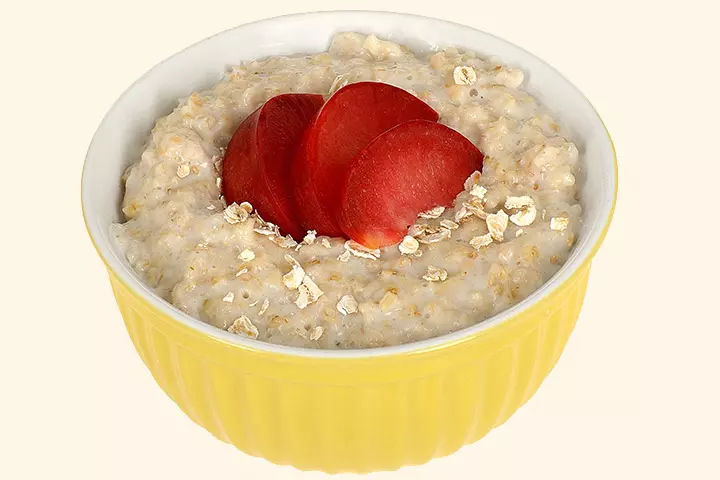
The high fiber content of plums and oats helps boost your baby’s digestive microflora. Besides, the rich micronutrient composition of this recipe supports your baby’s healthy growth and development.
You will need:
- 1 cup rolled oats
- 1 cup full-cream milk
- ½ cup fresh plums
- Water
How to:
- In a pan, add the milk and oats and cook according to the instructions given on the packet. Remove and keep aside.
- Meanwhile, boil water in a pan and add the plums. After about 45 seconds, take them out using a spoon. Place them in chilled water and remove the peel.
- Once cool, mash the plums using your fingers.
- Add the mashed plum to the oats porridge.
- If you wish, you may also add some finely sliced or powdered cinnamon, dried fruits such as almonds, walnuts, and pistachio to this recipe. This will boost the nutritive value of the recipe multi-folds.
4. Baked plums with cinnamon
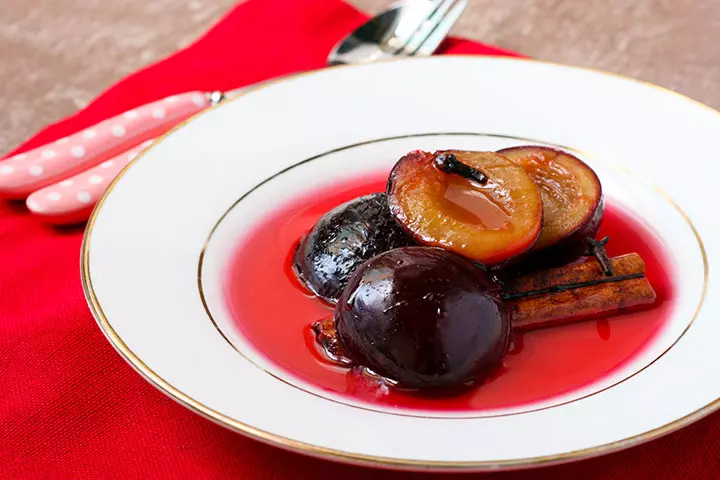
Cinnamon has several health benefits when consumed regularly, and makes a good addition to your baby’s diet. The spice can be added to a variety of recipes to enhance their nutritive composition.
You will need:
- 1 cup fresh plums
- 1 tsp cinnamon powder
- 2 tbsp apple juice
How to:
- Preheat the oven to 400°F (204°C).
- Slice plums in half and remove the seed. Place them in an oven-safe dish.
- Add apple juice and sprinkle some cinnamon powder over the top.
- Cover the dish and bake for about 25 minutes or till the plums turn tender.
- Once cool, remove the skin and mash using your fingers.
- Serve the recipe warm with some toasted bread slices.
5. Roasted plums with yogurt
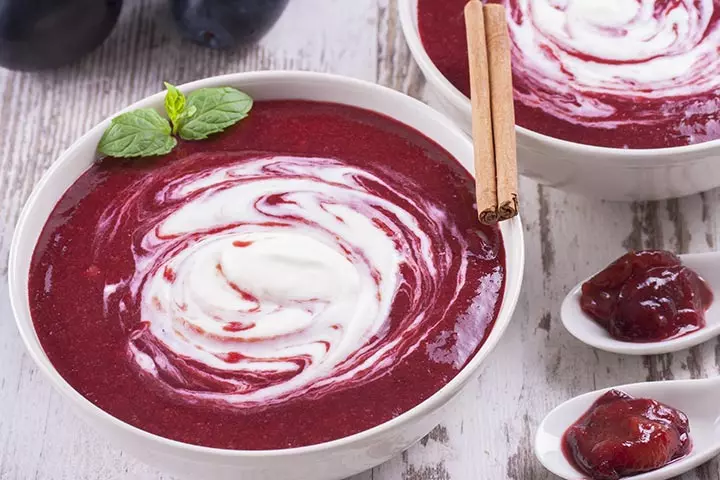
This tasty recipe is yet another version of plum puree with yogurt. Here the plums are roasted instead of being blanched or steamed. This way of cooking enhances the flavor of the plums and makes the recipe more delectable.
You will need:
- 1 cup fresh plums
- 1 cup unsweetened plain yogurt
- 1 tsp vanilla pod or essence
- 1 tbsp unsalted butter
- Pure maple syrup
How to:
- Preheat the oven to 375°F (190°C).
- Slice plums in half and remove the seed. Place them in an oven-safe dish with the cut portion on the top.
- Place a small piece of the vanilla pod on each plum piece. Also, add a little butter and a drop of maple syrup on each piece.
- Place in the oven and roast for about 30 minutes or till the plums turn tender.
- Once cool, remove the skin, mash, and serve as a puree mixed with yogurt.
6. Frozen plum puree
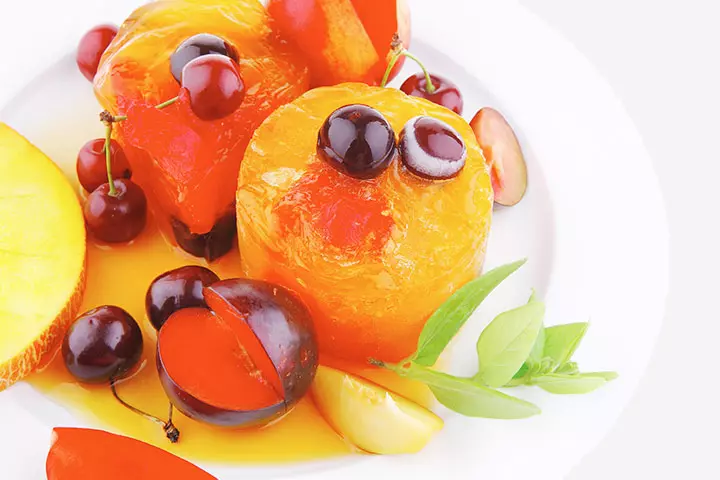
Most babies find ice creams and candies attractive. You can satiate your baby’s craving for cold desserts through this frozen plum puree recipe. This recipe is delicious and nutritious. Besides, this preparation might help soothe the aching gums of teething babies.
You will need:
- 1 cup fresh plums
- Water
How to:
- Cut plums in half and remove the seed.
- In a pan, add water. Place the plums in the pan with the cut portion facing the water. Let it simmer on low to medium heat till plums turn tender.
- Once cool, remove the skin.
- Add the plums and the water to a blender and make a puree. Add more water to get a liquidy consistency. Place into an ice tray and freeze the baby plum puree.
- Take out of the freezer just when you are ready to serve the same to your baby.
7. Plum jam
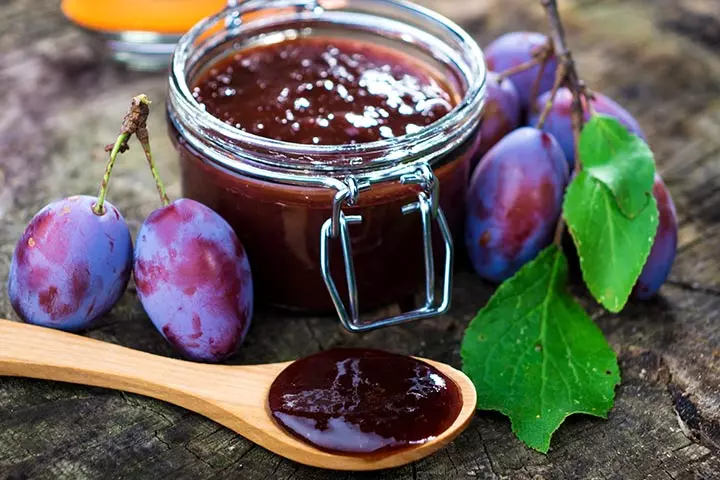
Babies enjoy having jam due to its semi-solid consistency. However, the high sugar content is a concern. This plum jam recipe uses the natural sweetness of plum instead of added sugar. You can serve plum jam to your baby with a slice of wholegrain bread or crackers.
You will need:
- 1 cup fresh plums
- 1 tbsp ground allspice (optional)
- 1 tsp cinnamon powder
- Water
How to:
- Cut the plums in half and remove the seeds. Place in a pan and add water and sugar. Let it boil till the plums are soft.
- Remove from heat and puree. Add the puree back to the pan and add allspice and cinnamon. Cook on low heat till it becomes thick, just like jam. Remove and let it cool before storing it.
- Store the prepared jam in an air-tight container in your refrigerator and label the date of preparation.
- Ensure to finish the jam within a stipulated time as homemade jams tend to expire faster than commercial ones.
8. Plums and bananas with quinoa
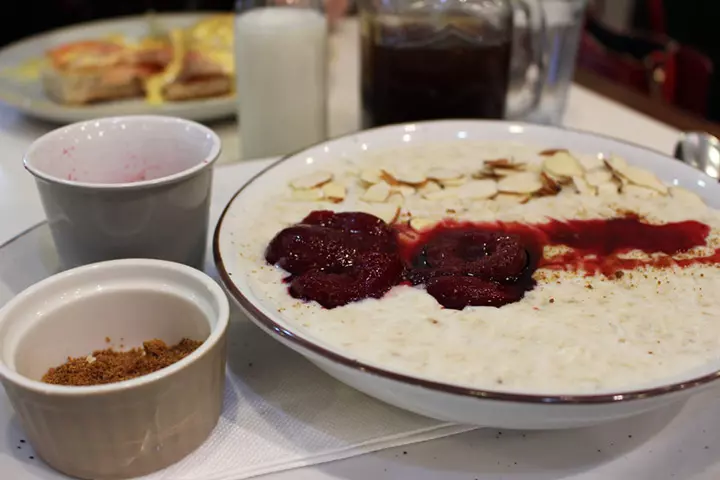
Quinoa is a pseudocereal that makes a healthy addition to an infant’s diet. The nutritional properties of quinoa are promising, and its regular consumption is associated with several health benefits. This recipe is an interesting combination of quinoa with plums that will become your baby’s favorite in no time.
Note: This recipe contains cow’s milk and is suitable for babies older than 12 months. It is important that the quinoa is dehulled and your baby is not allergic to it.
You will need:
- 1 cup fresh plums
- 1 banana (mashed)
- ½ cup quinoa
- 1 cup full-cream cow’s milk
- 1 tsp cinnamon powder
How to:
- Cook quinoa in milk as per the directions given on the packet of quinoa.
- Add deseeded and peeled plums with the banana in a blender. Blend till you get a smooth semi-fluid consistency of the paste.
- Add the paste to quinoa porridge. Sprinkle some cinnamon on top and serve it to your baby while it is still warm.
9. Plum and ginger smoothie
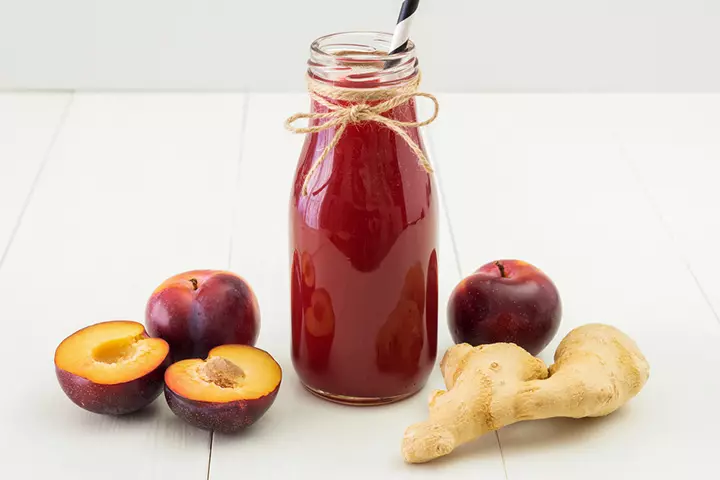
Smoothies are easy to prepare, easy to digest, and can also meet your growing baby’s nutritional needs. This smoothie recipe is a blend of plums and banana with a dash of ginger juice.
You will need:
- 1 cup fresh plums
- 1 medium-sized banana
- 1 tsp ginger juice
- 1 tbsp dried fruits powder
- 1 cup water
How to:
- Place the plums in a pan and add water. Let it boil till the plums turn tender. Remove from water, blend to a puree, and keep it aside for a while.
- Add sliced banana, ginger juice, and dried fruit powder in the blender and blend until thoroughly mixed.
- Add plum puree to the mix and blend once again. Ensure that the mix has no lumps. Add water to dilute the smoothie, if required. Strain the smoothie to remove any excess residual.
- Pour it into your baby’s sipper cup and serve.
10. Plum, peach, apricot, and thyme custard
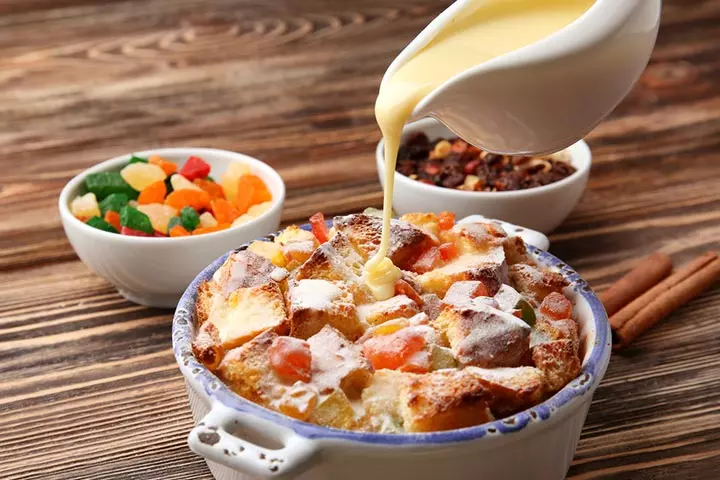
This recipe brings the sweetness and creaminess of custard, along with nutrition from selected stone fruits like plums, apricots, and peaches for babies. It is a suitable recipe for babies older than six months. Before introducing it to your baby, check for any possible food allergies.
Note: This recipe contains cow’s milk and is suitable for babies older than 12 months.
You will need:
- 1 ½ tbsp custard powder
- 1½ cup full-cream cow’s milk
- ½ cup plums
- ½ cup peach
- ½ cup apricot
- 1 tsp nuts (fine-chopped)
- A pinch of thyme
How to:
- Preheat the oven to 350°F (176°C).
- Cut the fruits and remove seeds. Place the fruits in an oven-safe dish with a cut portion facing down. Pour cold water over the fruits. Bake for about 40 minutes or until the fruits are tender.
- Once cool, remove the skin. Place fruits in a blender and blend well until you get a smooth paste. Keep this fruit puree for babies aside for a while.
- For the custard, take a small bowl and put custard powder in it. Now, add one-fourth cup of milk to it and mix well with a continuous whisk. Stir continuously to ensure there are no lumps. Once done, set aside.
- Now, heat the remainder of the milk in a pan. After five minutes of bubbling, simmer it and add custard powder slowly to the milk while stirring the milk continuously.
- Mix until the mixture thickens to a creamy consistency. Switch off the flame once done and keep the pan aside to cool.
- Once the custard and milk mixture has cooled, add the fruit puree to it with some finely sliced fruit pieces. Refrigerate the final mix for 20 minutes.
- Serve with some finely sliced nuts and serve it to your baby at room temperature.
A mother of two and a blogger who owns the blog Ma Hart’s Kitchen shares her love for plums and how she incorporates them into her family’s meals. She says, “Despite being at the tail end of the season, plums still seem to be in abundance. I really love cooking with them, in both savoury and sweet dishes, or just to snack on as is. My children love them too, and they’re really easy for those with few teeth to manage, especially if lightly stewed, although be warned, your child will emerge post-plum, as though from a massacre. Whether serving for pud, breakfast or just a snack, be armed with a bib, plum goo ain’t for the faint-hearted (i).”
Here’s her simple recipe for stewed plums:
- Cut plums into quarters and remove the stones.
- Place them in a pan with a splash of orange juice, the zest of an orange or satsuma, a cinnamon stick, ½ teaspoon of ground ginger, a few cloves, and a star anise.
- Cover the pan and heat for about 5 minutes, ensuring the plums soften but retain their shape.
- Let the mixture cool so the plums can steep in the spices and juices, creating a naturally sweet syrup that pairs wonderfully with yogurt or as a standalone treat.
When preparing plum recipes for your baby, it’s important to prioritize safety. Try to choose fresh, organic plums that are not mushy and are free from blemishes. Wash them thoroughly under running water to remove pesticides or chemicals before proceeding.
When To Avoid Plums For Babies
It’s important to know when to avoid giving plums to your baby. Here are some points you should keep in mind.
- Do not offer plums to your baby if they show any signs of fruit allergies. Although plum allergies are uncommon, some babies may develop sensitivities to fruits within the Rosaceae family, which includes plums, peaches, and cherries (11).
- Avoid plums if your baby has diarrhea. Plums are a natural source of laxatives, which may lead to stomach upset or diarrhea (1).
- Do not offer any fruit juices, including plum juice, to babies under one year of age, as they can lead to tooth decay (12).
Frequently Asked Questions
1. What can I mix with plum for baby food?
You can prepare a lump-free plum puree or mash and mix it with different foods, such as Greek yogurt, porridge, and oatmeal. Alternatively, you can mix plum puree/mash to puree/mash of other fruits and veggies to make nutritious baby foods. As your baby grows, you can serve them soft and ripe plum slices to practice self-feeding.
2. How do I introduce plums to my baby?
Like any other food, feed plum puree or mash to your baby in small quantities initially. Once the baby adjusts to the fruit’s taste and digestibility, gradually increase the puree/mash quantity. As stated above, you can also add plums to other foods in age-appropriate ways to enhance the overall nutritional value of the dish.
3. How do I safely store homemade plum baby food?
Plum baby food may be stored in glass or BPA-free containers for up to three days in the refrigerator. They may stay good up to three months if frozen.
4. Should I avoid giving my baby any plum products that contain added sugars or preservatives?
As per the guidelines of the American Academy of Pediatrics, added sugars, such as brown sugar, corn syrup, dextrose, fructose, glucose, lactose, malt syrup, maltose, molasses, raw sugar, honey and sucrose should be minimized in children’s diet as they may cause adverse health effects (13). Try to use organic plums and ingredients while trying out these recipes for your little one. Preservatives are also considered harmful for children (14).
Knowing some plum baby food recipes can be helpful for moms. Dried and fresh plums are delicious and rich sources of essential nutrients such as vitamin A, C, E, and K, including potassium, magnesium, and phosphorus. This also contains fibers that promote digestive health. You may give cooked plums to babies since they may not be able to digest fresh fruit and cause abdominal pain or discomfort. Plum puree, plum yogurt, oats, and plum porridge are some of the easiest plum recipes for infants.
Infographic: Health Benefits Of Plums For Babies
Plums are a nutritious choice for babies. They are a rich source of vitamins, minerals, and fiber, including vitamins A and C and potassium. It’s important to introduce plums to your baby gradually and in small amounts to ensure they tolerate the fruit well. The below-given infographic provides more information about the benefits of plums for babies. Read on!
Some thing wrong with infographic shortcode. please verify shortcode syntaxIllustration: Easy And Delicious Plum Baby Food
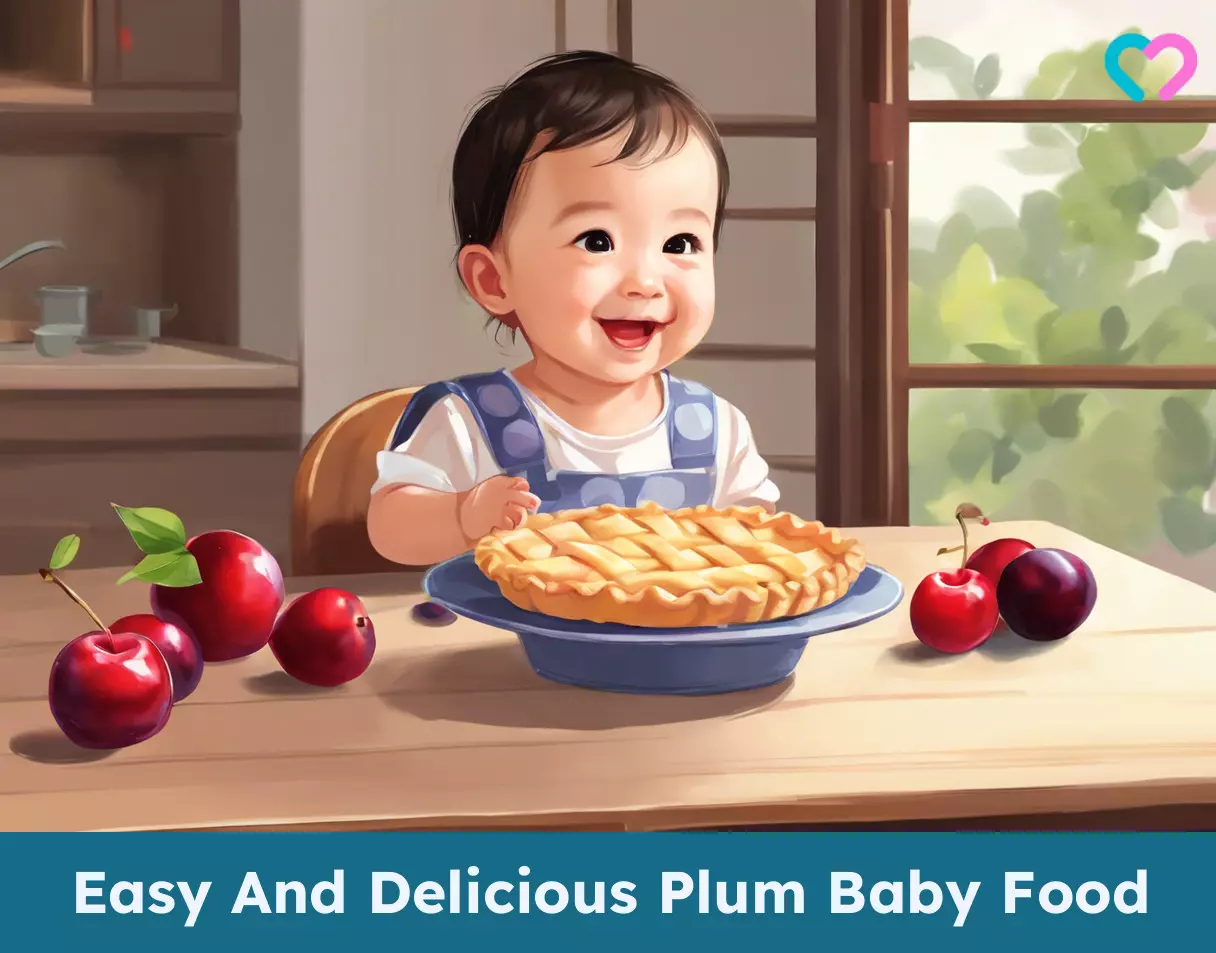
Image: Stable Diffusion/MomJunction Design Team
Discover the art of creating a delectable and nourishing plum puree for your baby through this concise and engaging video tutorial.
Personal Experience: Source
MomJunction articles include first-hand experiences to provide you with better insights through real-life narratives. Here are the sources of personal accounts referenced in this article.
i. Plum Puddinghttps://mahartskitchen.wordpress.com/2014/10/30/plum-pudding/
References
- Xian Lin et al.; (2025); Plum and Its Products.
https://www.taylorfrancis.com/chapters/edit/10.1201/9781003205449-12/plum-products-xian-lin-baojun-xu-jessica-pandohee - Ezinne O Igwe and Karen E Charlton; (2016); A Systematic Review on the Health Effects of Plums (Prunus domestica and Prunus salicina).
https://pubmed.ncbi.nlm.nih.gov/26992121/ - Hudda Ayub et al.; (2025); A comprehensive review on the availability of bioactive compounds phytochemicals and antioxidant potential of plum (Prunus Domestica).
https://www.tandfonline.com/doi/full/10.1080/10942912.2025.2249254#abstract - Taylor C Wallace; (2017); Dried Plums Prunes and Bone Health: A Comprehensive Review.
https://pmc.ncbi.nlm.nih.gov/articles/PMC5409740/ - M Stacewicz-Sapuntzakis; (2013); Dried plums and their products: composition and health effects–an updated review.
https://pubmed.ncbi.nlm.nih.gov/24090144/ - Ezinne Igwe and Karen Charlton; (2016); A Systematic Review on the Health Effects of Plums ( Prunus domestica and Prunus salicina ).
https://www.researchgate.net/publication/298899398_A_Systematic_Review_on_the_Health_Effects_of_Plums_Prunus_domestica_and_Prunus_salicina - Raj K Keservani et al.; (2016); Medicinal Effect of Nutraceutical Fruits for the Cognition and Brain Health.
https://pmc.ncbi.nlm.nih.gov/articles/PMC4757744/ - Maximize Your Nutrients From: APPLES, PEACHES, PEARS, PLUMS AND APRICOTS.
https://localfoods.osu.edu/sites/localfoods/files/imce/Apples%20pears%20peaches.pdf - Plum Good Health Benefits.
https://today.tamu.edu/2015/09/28/plum-good-health-benefits/ - Jose Manuel Silvan et al.; (2025); Modulation of Antibacterial Antioxidant and Anti-Inflammatory Properties by Drying of Prunus domestica L. Plum Juice Extracts.
https://pmc.ncbi.nlm.nih.gov/articles/PMC7023223/ - Joana Costa and Isabel Mafra; (2025); Rosaceae food allergy: a review.
https://pubmed.ncbi.nlm.nih.gov/35238686/ - Weighing in on fruit juice: AAP now says no juice before age 1.
https://publications.aap.org/aapnews/news/14804/Weighing-in-on-fruit-juice-AAP-now-says-no-juice?autologincheck=redirected - How to Reduce Added Sugar in Your Child’s Diet: AAP Tips.
https://www.healthychildren.org/English/healthy-living/nutrition/Pages/How-to-Reduce-Added-Sugar-in-Your-Childs-Diet.aspx - Common food additives and chemicals harmful to children.
https://www.health.harvard.edu/blog/common-food-additives-and-chemicals-harmful-to-children-2018072414326
Community Experiences
Join the conversation and become a part of our nurturing community! Share your stories, experiences, and insights to connect with fellow parents.
Read full bio of Seeemaa Budhraja
- Alicia Chacha Miller is a registered dietitian specializing in maternal and pediatric nutrition. She holds an MS in Nutrition Science from the University of Southern California and founded Cardamom Nutrition.
 Alicia Chacha Miller is a registered dietitian specializing in maternal and pediatric nutrition. She holds an MS in Nutrition Science from the University of Southern California and founded Cardamom Nutrition.
Alicia Chacha Miller is a registered dietitian specializing in maternal and pediatric nutrition. She holds an MS in Nutrition Science from the University of Southern California and founded Cardamom Nutrition.
Read full bio of Swati Patwal
Read full bio of Rohit Garoo
Read full bio of Ghazia Shah






